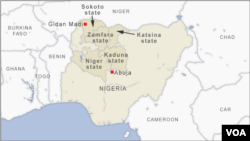Two police officers were killed when some 100 gunmen attacked and overran a police base in Nigeria's northwestern Sokoto state on Thursday.
The gunmen, disguised in military uniforms, struck a police base in the Tangaza local government area around 1 a.m. local time. Authorities say a divisional police officer and an inspector there were overpowered and killed, and their firearms confiscated.
The suspects also abducted two women believed to be wives of prominent businessmen in the area.
In May, at least 60 people were killed in an attack in the same region.
A leader of the International Association of Educators for World Peace, Darlington Abdullahi, says Thursday's attack bears the mark of terrorist groups found in northeastern Nigeria.
"A lot of the insurgents or terrorists disappeared from there and started shifting to other ungoverned spaces within our nation," Abdullahi said. "And that's when many of them began to shift to the northwest where issues now began to come up."
Boko Haram has been active in northwest Nigeria for over a decade and is known for attacking police outposts but has not been blamed for this particular incident.
Abdullahi says the attackers aim to lower public confidence in security officials and the government.
"The key thing is the people will now begin to feel that the government is incapable of taking care of them and that is the strong message that these people are passing. And that is one of the things that are required to establish insurgencies because they're able to lure people into their fold," he said.
Rising crime rates
The state police are currently investigating the attack and have deployed heavy security there.
But Senator Iroegbu, a security expert and founder of Global Sentinel, an online security magazine, blames government policies, as well as COVID-19 restrictions, for increases in crime rates.
"Even before then, Nigerian economy was not healthy, then COVID-19 came. And all over the world, governments are giving palliatives, bail outs, they're trying to cushion the economic effects on their citizens, and what did our government do? They increased tax, electricity tariff, fuel price," Iroegbu said.
Security remains a major issue for the Nigerian government.
Last month, President Muhammadu Buhari approved a community policing plan in order to better fight crime in the country. But experts say poverty and economic hardship are major reasons for crime and unless addressed, crime rates will only increase.




